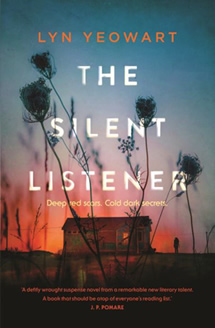Reviewed by Robert Goodman.
By Lyn Yeowart, Penguin, $32.99.
 According to the publisher, Lyn Yeowart’s debut novel The Silent Listener is “loosely based on events from her childhood growing up in rural Victoria”. Given the things that happen in this book, particularly to children, it is fervently hoped that they are not events that specifically happened to her. Because The Silent Listener is a descent into the darkness that can lie behind the façade of bucolic country life. And more tragic, the blind eye that people took to that darkness, and potentially still do.
According to the publisher, Lyn Yeowart’s debut novel The Silent Listener is “loosely based on events from her childhood growing up in rural Victoria”. Given the things that happen in this book, particularly to children, it is fervently hoped that they are not events that specifically happened to her. Because The Silent Listener is a descent into the darkness that can lie behind the façade of bucolic country life. And more tragic, the blind eye that people took to that darkness, and potentially still do.
The book opens in 1983 and Joy Henderson has returned to her family property to care for her seriously ill and ailing father George together with her sister Ruth. Not long after that he is dead, although it is not until later that readers learn of the suspicious circumstances surrounding that death. In the meantime, the tale drops back to the 1940s, when George is courting Joy’s mother Gwen, the 1960s, when Joy is ten and trying to make sense of the insular, violent world created by her father and process the disappearance of a little girl on the neighbouring property, and the days leading up to George’s death. When the current day narrative catches up to the opening, it progresses with the investigation by the local police constable.
In George Henderson, Yeowart has delivered what is unfortunately a very familiar monster. A man who abuses his wife and beats his children but is all smiles in public – an elder of the church and a respected community man. He relies on isolation of his property, the silence of his family and the complicity of those who will not look any further or act on their very real suspicions. And Joy is now old enough to recognise how damaged she was by him and yet, still in some ways, acting like that little girl eking out her tiny acts of revenge.
Yeowart’s personal experience is clear in the way she manages to capture the landscape of country Victoria. The sparsely populated, dilapidated farms, the constant burning of rubbish, the eel-filled dams and the constant mud in the past, juxtaposed against a dusty, tinderbox dryness in the “present day” sections of the narrative.
The cover up of family abuse and the generational trauma it causes is an important subject and Yeowart deals with it with understanding and empathy. But in the end The Silent Listener is not as revelatory as it would like to be. With the exception of the very final pages which put an even darker, more tragic spin on what is already a black tale, the twists in the narrative are fairly predictable. Overall, an engaging debut but ultimately a pain filled excursion into the regional Australia in the second half of the Twentieth Century.
This and over 600 more reviews can be found on Pile by The Bed.











